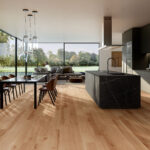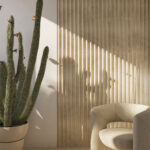Hard Made Easy
If you’ve never heard of sintered stone before, then allow us to introduce you to Lapitec. This new, high-tech surface is rapidly changing the game for flooring and countertops, and even going places you would never expect a slab to go.
When designers hear the term “engineered stone,” more often than not they tend to think of quartz. After all, quartz has long been the prime choice for high-quality engineered stone surfaces. At least for countertops, that is.
Of course, flooring is a different story. Since quartz slabs are similar in cost per square foot to quartzite and other natural stone surfaces, it is not usually considered for flooring. Rather, the “go-to” surface for flooring is often porcelain tile. Like quartz, porcelain is very hard and durable. In fact, premium modern porcelain tile is durable enough to be used as flooring both indoors and out. So perhaps it is not surprising that porcelain is also at the heart of Lapitec.
The Sintered Solution
Lapitec is manufactured from ceramics materials just like porcelain. And, like porcelain, heat is a key part of its manufacturing process. But that’s really where the two diverge.
Lapitec is forged through a patented process known as “sintering.” This process involves applying immense heat and pressure to the constituent ceramic materials until they reach the point of liquefaction, about 1,200°C (2,192°F). This approximates the geologic forces within the earth’s crust that create stones such as granite or marble.
Better Than Stone
The result is an engineered stone surface that is extremely hard and incredibly durable. It is harder than quartz, and more durable than porcelain. It is scratch-resistant, stain-resistant, and is even resistant to chipping. Lapitec is manufactured in high temperatures, so it is naturally heat-resistant. It’s also impervious to cold or frost, and resistant to yellowing or discoloration from UV exposure. Unlike natural stones such as granite, quartzite, or marble, Lapitec is not porous, and thus does not need to be regularly treated with sealant.
Lapitec’s superlative hardness allows it to be forged into extra-large, yet surprisingly thin and light slabs. It can be used for countertops, walls, and flooring inside or out. It can even be used as cladding for building exteriors.
Like porcelain, Lapitec is available in a variety of colors, and can even be manufactured with veining that makes it look like marble. However, while porcelain is usually “printed” with designs only on the surface, Lapitec comes in full body (or “through-body”) slabs that are the same design and color all the way through. This means that edges can be exposed or beveled without impacting the natural look of the stone. This is huge for countertops.
The Down Side
Obviously, all of these features are sure to excite interior designers, builders, and homeowners, but there have to be some drawbacks too, right?
Actually, there aren’t really a whole lot of drawbacks.
Because Lapitec is manufactured by a patented process, there are few competitors in the arena of sintered stone. This means that there aren’t a lot of variations in color or texture available, at least not yet. However, the mounting popularity of this superlative surface will almost certainly lead to more variety reaching the market soon.
Another concern for many is cost. Lapitec is generally more expensive than other engineered surface options, especially since its extreme hardness requires special tools for cutting and drilling it. However, it should be noted that Lapitec still compares favorably to premium natural options like granite, quartzite, or marble while dramatically outpacing them in terms of durability, so it should be considered a premium option regardless.
The Future of Engineered Stone
If all this is leading you to conclude that Lapitec is really the future of the engineered stone market, you’re probably correct. Not only is this incredible surface material an improvement on other engineered options, but the technology behind it is still in its infancy. It’s reasonable to expect that, in addition to a greater selection of stylistic choices, we will also see improvements in quality and durability as time progresses.
Lapitec, and sintered stone products, are here to stay.
Shop for Lapitec products now online at opustone.com



